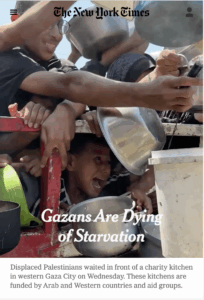It’s a well-known tactic: Hamas uses staged photography to spread its propaganda around the world. But this time, it’s even worse than you think.
That video you may have seen in The New York Times—the one featured in its report titled “Gazans Are Dying of Starvation”—was filmed in what has now been identified as a Hamas-approved staging area. The dramatic scene shows hungry Gazans lining up for food at a soup kitchen. But this isn’t spontaneous documentation of a humanitarian crisis. It’s part of a coordinated effort to manipulate public perception.

Hamas is actively pushing the narrative that Gazans are “dying of starvation,” and they want you to believe that Israel is to blame. That’s why day after day, photographers are summoned to the same site to capture photos of suffering.
The reality? These people are about to get fed.
But before they do, Hamas and its loyal photojournalists—many of whom work for international agencies—ensure that images of desperation are what reach the global press. It’s cynical. It’s cruel.
And yes, the media eat it up.
What You Need to Know
A new BILD exposé confirms what HonestReporting has documented meticulously and extensively since the start of the war: Hamas exploits the suffering of its own people to drive a propaganda campaign against Israel. Here’s how it works:
-
Close-ups and carefully selected angles create the illusion of chaos and starvation.
-
Photographers deliberately avoid showing the orderly distribution of food.
-
Emotional scenes of children, elderly women, and men holding empty pots are captured before food is handed out—never after.
In reality, this scene is a soup kitchen, and many of those photographed receive food moments later.
The Photographer Behind the Lens
The BILD investigation focuses on Anas Zeyad Fteiha, a Gaza-based freelance photographer for Turkey’s state-run Anadolu Agency. The piece reveals how Fteiha’s images are curated to evoke maximum outrage.
According to BILD, Fteiha consistently avoids photographing the actual distribution of food. Instead, he captures only the queues, the hungry faces, the empty bowls—never the moment of relief. It’s selective storytelling designed to manipulate.
And it is effective: Fteiha’s images are regularly used by top international outlets, including CNN, BBC, and others.
This Is Bigger Than One Photographer
Fteiha is not an outlier. As BILD notes, HonestReporting has already exposed multiple Gaza-based photographers with ties to Hamas—some of whom were actively embedded with terrorists during the October 7 massacre in southern Israel.
These are not neutral observers. They are operatives with cameras, shaping global headlines in Hamas’s favor.
Related Reading: Broken Borders: AP & Reuters Pictures of Hamas Atrocities Raise Ethical Questions
What the Media Leaves Out
Photos of malnourished children, women holding empty pots, and elderly men appearing desperate must prompt critical questions:
-
Do these images tell the whole story?
-
What’s just outside the frame?
-
Who is deciding what gets shown—and what doesn’t?
Selective framing is not just misleading. In a warzone, it becomes a weapon of narrative warfare.
Liked this article? Follow HonestReporting on Twitter, Facebook, Instagram and TikTok to see even more posts and videos debunking news bias and smears, as well as other content explaining what’s really going on in Israel and the region. Get updates direct to your phone. Join our WhatsApp and Telegram channels!
Image Credit: Khames Alrefi/Anadolu via Getty Images


